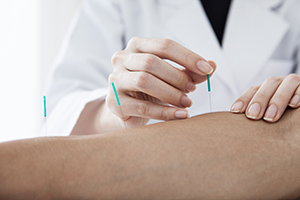Acupuncture Therapy for Pancreatitis

For over 30 years clinical trials have been validating the efficacy of acupuncture. Now, nearly all of the U.S. News & World Report Honor Roll hospitals offer this treatment option and explaining just how it works has recently become much easier.
A cutting-edge, high-powered microscope has enabled scientists to look inside living tissue without removing it from the body. They can now see and photograph the fluid-filled space between our skin and our muscles – the interstitium1 – which is what Traditional Chinese Medicine (TCM) practitioners refer to when they say they are moving a patient’s “Qi”.
When managing pancreatitis and diabetes, an acupuncturist redirects the flow and access of hormones and biochemicals to and from the pancreas, like an irrigation canal diverts dangerous floodwaters from important structures.
Whether they call it balancing biochemicals or moving Qi, acupuncturists have successfully resolved organ dysfunction and pancreatitis symptoms for millions of patients around the world.
To find out if this option is right for you and your current state of health, speak with a qualified acupuncture practitioner in Encino, by calling (424) 365-1800 or clicking contact Dr. Jeremy Fischer online.
What pancreatitis symptoms can acupuncture relieve?
Pancreatitis is an acute or chronic inflammation of the pancreas. Although many mild cases go undetected, approximately 87,000 Americans are treated for pancreatitis annually, and about 900,000 end up in the ER. How does this multi-tasking organ deteriorate to such painful extremes?
As the quantity and/or quality of pancreatic digestive enzymes and hormones – like insulin and glucagon – become more and more imbalanced, they can cause these acute symptoms:
- upper abdominal pain that radiates toward the back, especially after eating
- nausea and vomiting
- fever
- rapid pulse
- tenderness when touching your upper abdomen
As the biochemical imbalance and inflammation intensify, these additional chronic symptoms may develop:
- slow, steady weight loss
- oily, terrible-smelling diarrhea (steatorrhea)
Consulting with a medical provider to diagnose or rule out pancreatitis is crucial, as patients often mistake them for these common conditions:
- indigestion
- foodborne illness (food poisoning)
- gas
- menstrual cramps
- abdominal hernia
- constipation
- irritable bowel syndrome (IBS)
- Crohn’s disease
- peptic ulcer
- kidney stones
- gastroenteritis
- appendicitis
- ulcerative colitis
- peritonitis
It is imperative to report, diagnose, and treat these symptoms and their underlying causes as soon as possible – damage to insulin-producing cells in your pancreas can lead to diabetes, malnutrition, and pancreatic cancer.
How acupuncture treats pancreatitis
Each of our acupuncture points (or meridians), which shows up in different colors from surrounding tissue on infrared imaging photos, has a function.
Our C fibers – pathways for our nervous system messages – branch precisely at these meridian points, which have a lower electrical resistance than surrounding skin.
These meridians also have high concentrations of:
- nerve bundles
- immune-regulating mast cells
- lymphatics
- capillaries
Stimulating specific points can reduce pain2, boost the immune response, or regulate hormone production to correct biochemical dysfunctions.
For example, MRIs have demonstrated that stimulating point LI 4 (large intestine 4) releases endorphins (natural painkillers).
Stimulating point ST 36 (stomach) – located at the bump just below the patella to the outside of the leg – can regulate pancreatic function by:
- increasing blood flow to pancreatic tissue
- regulating glucagon and insulin to balance blood glucose levels
- releasing neuropeptides
- sending inflammatory proteins and white blood cells to damaged tissue
- improving lowered pain threshold
An experienced acupuncturist will know exactly which points to stimulate to balance the flow of all these blood cells and biochemicals through your interstitium into your pancreas.
Do acupuncture needles hurt?
Unlike hollow hypodermic needles, acupuncture needles are filiform, or solid, and they gently part your tissue. Occasionally, insertion can cause minor bleeding or bruising. If inserted properly, they usually don’t even leave a trace.
“Pressure” or “a heavy sensation” is how most patients describe the feeling when a needle is properly inserted. If you feel any pain, tell your practitioner and the angle of the needle will be shifted immediately. Some acupuncturists insert them through a plastic guide tube.
Inserting a needle into the correct point may induce your body to produce B-endorphin, a natural opiate 10-100 times more potent than morphine, which can circulate for several hours.
Acupuncture needles are:
- sterile
- single use
- highly flexible
- superfine: from 0.16 mm to 0.46 mm in diameter; from 13 to 130 mm in length
- stainless steel based: sometimes adorned with copper or gold handles
As it does with other medical devices, the FDA regulates acupuncture needles, while certified practitioners abide by manufacturing practices and single-use sterility standards. It’s crucial to work with a certified, experienced provider. Always do your research.
Who offers acupuncture?
Acupuncture is no longer only for TCM practitioners. Chiropractors, functional and integrative medicine practitioners, orthopedic providers, and even traditional family practice MDs now become certified and offer acupuncture as a treatment option for specific conditions. The Affordable Care Act has made it possible for insurance companies to cover acupuncture providers who are not MDs.
Acupuncture is especially useful for patients who don’t want to take side-effect-laden medications, especially highly addictive opioid painkillers.
Does acupuncture cause side effects?
When performed properly by a skilled practitioner, acupuncture has few or no side effects. Minor side effects may include: bleeding, swelling, or bruising at or near the puncture sites, mild discomfort. Rarely, inappropriate needles may cause infection, punctured organs, collapsed lungs, or damage to the nervous system.
Choosing a well-researched and licensed practitioner minimizes any risks you’ll encounter during your treatment.
As with any medical procedure, results vary from patient to patient, depending on age, genetics, condition severity, as well as environmental and health factors. Consult your healthcare practitioner before embarking on your treatment journey.
Reserve Your Appointment
Pancreatitis causes painful inflammation of your pancreas that can occur once or repeatedly. If you want to avoid medications that target symptoms only, acupuncture can treat the root causes behind those symptoms while offering the pain relief you’re seeking without side effects.
To speak with an acupuncture specialist today in Encino, call (424) 365-1800 or contact Dr. Jeremy Fischer online.
Sources:
1 Petros C. Benias, Rebecca G. Wells, Bridget Sackey-Aboagye, Heather Klavan, Neil D. Theise. Structure and Distribution of an Unrecognized Interstitium in Human Tissues. Scientific Reports volume 8, Article number: 4947 (2018)
2 Juel, Jacob, et al. “Acupuncture for Pain in Chronic Pancreatitis.” Pancreas, vol. 46, no. 2, 2017, pp. 170–176., doi:10.1097/mpa.0000000000000749.
Vitality Integrative Medicine
Address
4849 Van Nuys BlvdSuite 104
Sherman Oaks, CA 91403
(424) 365-1800
www.vitalityintegrative.com
Hours
Mon:
8:00 am - 6:00 pm
Tue:
8:00 am - 6:00 pm
Wed:
8:00 am - 6:00 pm
Thu:
8:00 am - 6:00 pm
Fri:
8:00 am - 6:00 pm
Sat:
8:00 am - 12:00 pm

